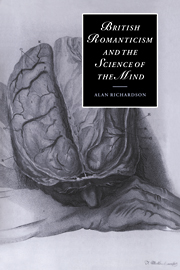Book contents
- Frontmatter
- Contents
- List of illustrations
- Preface
- List of abbreviations
- 1 Introduction: neural Romanticism
- 2 Coleridge and the new unconscious
- 3 A beating mind: Wordsworth's poetics and the “science of feelings”
- 4 Of heartache and head injury: minds, brains, and the subject of Persuasion
- 5 Keats and the glories of the brain
- 6 Embodied universalism, Romantic discourse, and the anthropological imagination
- 7 Epilogue
- Notes
- Bibliography
- Index
- CAMBRIDGE STUDIES IN ROMANTICISM
Preface
Published online by Cambridge University Press: 22 September 2009
- Frontmatter
- Contents
- List of illustrations
- Preface
- List of abbreviations
- 1 Introduction: neural Romanticism
- 2 Coleridge and the new unconscious
- 3 A beating mind: Wordsworth's poetics and the “science of feelings”
- 4 Of heartache and head injury: minds, brains, and the subject of Persuasion
- 5 Keats and the glories of the brain
- 6 Embodied universalism, Romantic discourse, and the anthropological imagination
- 7 Epilogue
- Notes
- Bibliography
- Index
- CAMBRIDGE STUDIES IN ROMANTICISM
Summary
The secondary literature devoted to William Wordsworth, by now extensive enough to stock a small library, has found no room to discuss a most remarkable feature of the poet's sensory life. Wordsworth's critics and biographers alike have made little or nothing of an intriguing psychophysiological oddity attested to both in Robert Southey's 1822 reminiscences and in Christopher Wordsworth's 1851 Memoirs: the poet “had no sense of smell.” Perhaps the near-total silence regarding Wordsworth's sensory deficit ever since is understandable. For many critics, at least until recently, it might have been seen as having anecdotal value at best, good perhaps for a donnish lecture joke. (“‘All the mighty world / Of eye and ear,’ – but not, sadly, of nose.”) In the present critical climate, however, with unprecedented attention to the centrality of sensation, of “organic sensibility,” perception, and the body within Romantic writing, Wordsworth's limitation to four of five external senses seems at least worth noting. If, as an influential critic has declared, Wordsworth's poetic project is “grounded in a regimen of the senses,” does the ground shift when one considers Wordsworth's alienated relation to at least one of those senses?
Put more directly, did his lifelong experience of a congenitally damaged sensorium affect the way Wordsworth himself understood sense experience, the sensory organs that variously channel it, the mind that anticipates, shapes, and interprets it?
- Type
- Chapter
- Information
- British Romanticism and the Science of the Mind , pp. xiii - xviiiPublisher: Cambridge University PressPrint publication year: 2001



